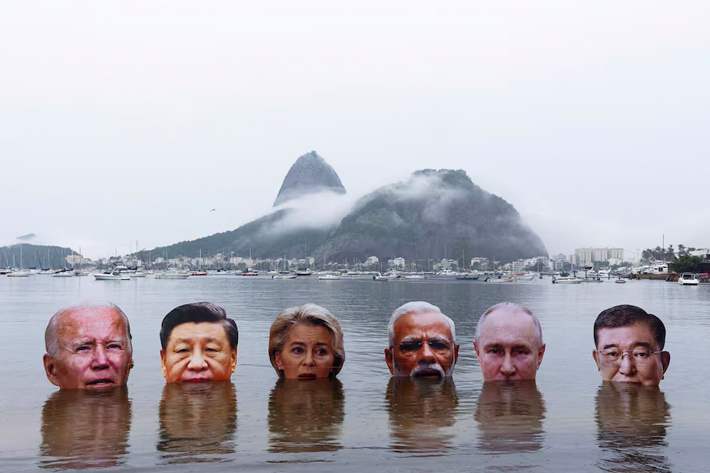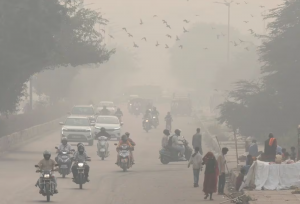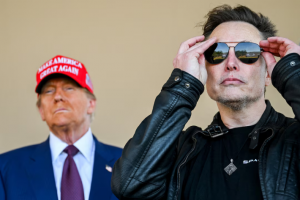Tensions over a lack of climate finance for developing countries made their way to the G20 summit this week, and led the wealthy group of nations to reach a “fragile consensus” on the hotly contested issue on Sunday, Reuters reported, citing sources.
Concerns about a lack of funding to help developing nations adopt climate technologies, cut emissions and tackle global warming-related disasters has been plaguing climate-related negotiations throughout this year.
Developing countries like China, India, Brazil and South Africa say rich countries — which account for higher historical emissions and are the main culprits for climate change — must provide trillions of dollars to help them cut their greenhouse gas emissions.
Also on AF: COP29: What Will Donald Trump Mean For Global Carbon Markets?
But wealthy countries, especially in Europe, have been saying that an ambitious climate financing agreement can only be reached if the base of contributors includes some of the richer developing nations, such as China and major Middle Eastern oil producers.
Developing countries such as Brazil have been pushing back on that demand.
Stalled talks on the issue were meant to make headway during the United Nations’ climate summit COP29 in Baku, which began last week.
But it is the leaders of the Group of 20 major economies — half a world away in Rio this week — that hold the purse strings for that financing. And diplomats close to the Rio talks told Reuters that the same fights that plagued COP29 since it began became central to G20 negotiations.
That changed early Sunday morning, however, as negotiators agreed to a text mentioning developing nations’ voluntary contributions to climate finance, stopping short of calling them obligations, two diplomats said.
The Trump shadow
If that agreement is accurate it may have some chance at sustaining the ongoing political tug-of-war. China, for instance, has spent an average $3.8 billion on climate finance for developing countries between 2013 and 2021, according to the Center For Global Development.
According to an analysis published on Carbon Brief, developing countries such as China, India, Brazil, Saudi Arabia and Mexico have been among the biggest contributors to climate finance distributed by multilateral institutions such as the World Bank.
Still, the breakthrough will remain overshadowed by the return to power of US President-elect Donald Trump.
While the US has historically failed to meet its promises on climate financing, this year it says it has fulfilled a pledge to increase its climate finance spending to over $11 billion a year.
But Trump believes climate change is a hoax, and aims to shut down policies he says are a “green new scam.” Experts say he is all but set to pull the United States out of the Paris climate agreement.
That would throw into doubt how much money the world can muster to address climate change, possibly without the support of the world’s largest economy.
Calls for consensus
G20 countries account for 85% of the world’s economy and are the largest contributors to multilateral development banks helping to steer climate finance.
As they meet in Rio de Janeiro through till Tuesday, heads of state of the bloc will address issues from poverty and hunger to the reform of global institutions and the escalating violence in Ukraine amid an invasion from Russia.
And global activists have been calling on them for steering climate financing dialogue as well.
“The spotlight is naturally on the G20. They account for 80% of global emissions,” UN Secretary General Antonio Guterres told reporters in Rio de Janeiro. He expressed concern about the state of the COP29 talks in Baku and called on G20 leaders to do more to fight climate change.
“Now is the time for leadership by example from the world’s largest economies and emitters,” Guterres said.
UN climate chief Simon Stiell also wrote a letter to G20 leaders on Saturday imploring them to act on climate finance, including boosting grants for developing nations and advancing reforms of multilateral development banks.
The success of not only COP29 but also the next UN climate summit, COP30 hinges on an ambitious deal on climate finance. Brazil, the host of COP30, says it is dedicated to keep alive the Paris Agreement target of limiting global warming to 1.5 degrees Celsius, even as scientists warn that might be impossible.
And developing nations maintain the G20 group of countries will be key to sustaining that threshold.
“It is technically possible to meet the goal of 1.5 degrees Celsius, but only if a G20-led, massive mobilisation to cut all greenhouse gas emissions … is achieved,” Bahamas Prime Minister Philip Davis said at COP29 last week.
- Reuters, with additional editing and inputs from Vishakha Saxena
Also read:
Trump Will Have Big Impacts on Trade, Climate Change, EVs
Fossil Fuels Set to Drive Global Emissions to a Record, Yet Again
‘We Are on a Road to Ruin’: COP29 Kicks Off Amid Trump Worry
Uncertainty on Methane Emission Fee as Biden Term Nears End
Scientists Say 2024 ‘Virtually Certain’ to be Hottest on Record
Floods or Drought: Climate Change Worsens Global Water Woes
Climate Change Has Cost China $32 Billion in Just One Quarter
Emissions of World’s Super Rich ‘Drive Economic Losses, Deaths’
Energy Emissions Set to Peak But ‘Not in Time’ For Climate Goals
Could Melting Glaciers Trigger Volcanic Eruptions? – Reuters
























